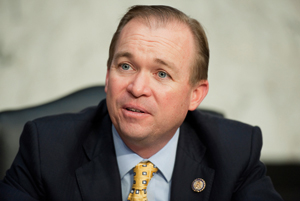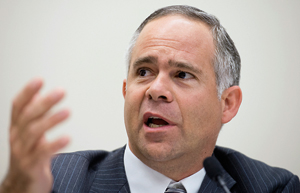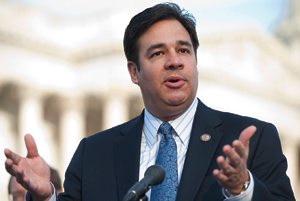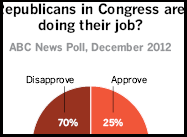CQ WEEKLY – COVER STORY
Jan. 12, 2013 – 3:14 p.m.
Speak Softly or Carry a Big Stick
By Jonathan Strong, CQ Staff
With his name approaching in the roll call, Republican
Mulvaney walked down the center aisle of the House to an open spot in the second row, only a few feet from the rostrum. He was one of the few people moving in the chamber on the early afternoon of Jan. 3, as the vote to elect the speaker for the 113th Congress continued around him.
“Mulvaney?” the clerk said, asking for his vote. “Mulvaney?”

|
||
|
The second-term lawmaker from South Carolina stayed silent, one of 13 Republicans who didn’t cast a vote for Ohio’s
The plotters had planned to force a chaotic and unpredictable closed-door Republican Conference meeting in which, they hoped, a would-be successor would rise to the occasion and challenge Boehner. Although the coup fizzled at the last minute, it represented the ultimate repudiation of the steps Boehner had taken, starting in earnest after the Nov. 6 election, to tame the restive right flank of his conference.
How Boehner and the rebellious members of his conference respond — both to the events of the past few months and particularly to the events of the first weeks of the new Congress — will show whether the speaker will try to consolidate his power at the risk of fracturing the rank and file, whether he will try to persuade the right flank to accept a truce and unify behind party priorities, or whether he will allow the House to continue to work its will, even if the result sometimes looks like a chamber in disarray.
How this will play out may become evident when GOP House members hold their annual retreat this week, preparing for the second inauguration of President
“Boehner has a majority of the majority, but without the rebels he doesn’t have a majority of the whole House,” says John J. Pitney, a professor of politics at Claremont McKenna College in California and an authority on Congress. “The rebels really want Boehner to perform magic that the speaker can’t perform. They’re holding him to an impossible standard, and as long as they’re continuing to do that, they’ll continue to have friction.”
The problem for Boehner is that, ever since his very first fights with Obama over spending in 2010, House Republicans have drawn different lessons from the results. The leaders want the rank and file to appreciate that unity is the key to success — that Boehner’s inability to command votes in the House frequently undercuts him in high-stakes negotiations with Democrats. But the party’s more conservative wing has concluded that Republicans are losing these battles — politically and substantively — because of an unwillingness to act decisively. They think the House GOP must be willing to hold out longer to force spending cuts, even if the result pushes the nation over the edge of some deadline crisis.
The degree to which Boehner has lost credibility with a portion of his conference is evident in the willingness of some rebellious Republicans to speak out. “It’s not like the House of 20 years ago, where the speaker can tell you, ‘Sit down and shut up,’” said
In the fiscal-cliff battle, Boehner took his boldest steps yet toward the center, culminating in the passage of a bill with mostly Democratic votes that even Majority Leader
The right wing moved boldly as well. A plot to unseat Boehner seemed practically unthinkable, until it played out on live television.
Speak Softly or Carry a Big Stick
The defectors were far from representative of most House Republicans. But heading into new partisan standoffs — over the debt ceiling, appropriations, the spending sequester and entitlement changes — there is a widespread sense that Boehner’s speakership hangs in the balance and that he badly needs a victory.
Blowback From the Right
Almost immediately after the 2012 election results came in, Boehner moved to consolidate his authority. He increased the number of votes he has on the GOP Steering Committee, which decides committee assignments, while decreasing the number of votes for the large class of lawmakers elected in 2010.
In the marquee campaign for conference chairman between his ally
Then, a top Boehner associate worked to get the conservative Republican Study Committee to choose

|
||
|
And on Dec. 3, the Steering Committee met and began a small purge of four rebellious Republicans from plum committee assignments: Huelskamp,
Boehner’s office was tight-lipped about the changes, even if the message was clear. “You want good things in Congress and to have a good career? Better play along nicely,” a GOP aide said, characterizing the message behind the actions.
Boehner’s moves within the House were coupled with a public shift toward the ideological center. Right after the election, he offered $800 billion in new tax revenue as part of a deal to avoid the fiscal cliff. “We’re ready to be led,” Boehner said in announcing the offer to Obama.
Next, in an interview with ABC News, Boehner suggested that efforts to repeal the 2010 health care overhaul law were finished, saying, “Obamacare is the law of the land.” He said he wanted an immigration overhaul, and downplayed the significance of the tea party.
Then, with the holidays approaching and the fiscal cliff negotiations proceeding, Boehner moved further out on the limb, offering not just additional revenue but also an increase in tax rates paid by top earners. That was on Friday afternoon, Dec. 14. The offer leaked Saturday night, and by Monday, Boehner had switched gears, planning to bring up a stand-alone tax bill that would preserve the 2001 and 2003 tax rates on incomes under $1 million.
The goal was to show Boehner’s ability to control the GOP conference. But the effort, dubbed Plan B, turned into an embarrassing defeat for the speaker and a warning sign that all wasn’t going according to his postelection plans. Although Minority Leader
The Ohio lawmaker cajoled, personally appeared at the GOP whip meeting and buttonholed members on the floor. He bluffed, promising reporters it would pass. Still, Republicans abandoned him. At a meeting in the basement of the Capitol on Dec. 20, Boehner offered a prayer and said the vote had been called off. He put responsibility for finding a solution to the cliff on the Senate and the White House.
Speak Softly or Carry a Big Stick
But by allowing Senate Minority Leader
But the seeds of an insurrection had been planted.
The process, according to one lawmaker who participated, consisted of small groups of GOP lawmakers independently reaching the conclusion that new leadership was needed and learning of one another’s existence by word of mouth on the House floor.

|
||
|
Boehner told Republicans he wasn’t interested in passing a cliff bill with mostly Democratic votes. But on New Year’s Day, he allowed just that to happen. Eighty-five Republicans voted for the deal, 151 against, including Cantor and McCarthy — a powerful symbol that the push for unity didn’t even extend to Boehner’s top lieutenants.
Meanwhile, Republicans Raúl R. Labrador of Idaho, Amash and Mulvaney were helping organize the plot to unseat the speaker. If 25 lawmakers signed on, the group agreed, they would all vote against Boehner on the House floor, denying him a first-ballot victory. They approached Cantor and
The group eventually decided to vote for several candidates to avoid suggesting that the recipient of their support had organized the rebellion.
On the morning of the vote, Jan. 3, one person, whose identity hasn’t been verified, switched his or her mind, leaving the group one short of its 25-member threshold. Thirty minutes before the vote, the plot was called off, releasing participants to vote how they wanted. Even so, more than half of the group abstained or voted against the sitting speaker.
And while Boehner had set out to tame the right, the situation was more out of control than ever.
“I felt like we needed somebody who was gonna fight for true spending cuts, big spending cuts that are absolutely necessary to get our spending addiction under control,” said Georgia Republican
Unapologetic in Their Ire
If anything, Boehner and other GOP leaders may have underestimated the depth of hard feelings about the previous two years among unhappy conservatives.
The day after he was thrown off the Budget and Agriculture committees, Huelskamp sat in his office in the Cannon building and calmly lit into the GOP leadership. The debt ceiling deal? “A massive disaster.” The continuing resolution for appropriations? “Confirmed Republicans were not willing to cut spending.”
Speak Softly or Carry a Big Stick

|
||
|
The 2012 election results, Huelskamp said, meant that Republicans needed to show more backbone. “When you lose eight seats in the House, and lose two or three seats in the Senate when you should have picked up five, and you can’t beat Mr. Obama in the worst economic recovery in history — and what you’re doing is purging conservatives? That’s a political disaster,” he said.
“My guess is my constituents are going to be mad as a hornet about it. And they’re not gonna punish me. They’re gonna say, ‘We’ve had enough of Washington.’ ”
Huelskamp was informed of his fate in a phone call from
It wasn’t until nine days after the purge that
“What I tried to explain to them was, it didn’t have anything to do with your voting record, a scorecard, your work across the street or anything else,” Westmoreland said. “It had to do with your ability to work within the system and to try to work. And to be, I guess, constructive in things. And I said, ‘I guess you could say it was an asshole factor.’ ”
Westmoreland’s remarks were blunt, and they resonated with many rank-and-file Republicans skeptical about the conservative rebels. In particular, they question whether the rebels know what they want? And do they have a plan to get it?
Huelskamp, in particular, draws the ire of some of his colleagues. Shortly after the coup attempt, the Kansas Republican cited his vote against the speaker in an appeal for campaign contributions.
His fundraising email was accompanied by a photo of Boehner shaking Obama’s hand at the beginning of a State of the Union address with the caption, “Do you agree with my vote against John Boehner? Stand with me against the Washington Establishment.”
The question is whether Boehner, now weakened, really stands in their way, or whether the rebels will force his hand into a showdown with Obama and the Democrats.
“It may be we need to go over some cliff, cross some Rubicon, so conservatives feel like we had that fight,” one GOP aide said.
Or as Broun said, “Mr. Boehner has promised us as a Republican Conference that he was going to act in a different way towards the president, that his negotiations were gonna be in a different manner. So, I’m excited that he has decided that he’s going to be a bare-knuckle fighter just like
After the New Year’s resolution of the fiscal-cliff crisis,
Speak Softly or Carry a Big Stick
In Custer’s last stand, however, he and his troops didn’t survive the encounter.
for further reading: Fiscal cliff, CQ Weekly p. 24; Boehner’s rising challenge, 2012 CQ Weekly, p. 1830; 2011 debt limit agreement (PL 112-25), 2011 Almanac, p. 3-11